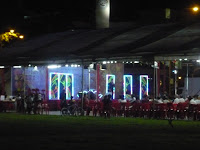 Chinese New Year (otherwise known as Lunar New Year) represents a new year in the lunar calendar. The festival begins on the first day of the first lunar month in the Chinese calendar and ends on the 15th day.
Chinese New Year (otherwise known as Lunar New Year) represents a new year in the lunar calendar. The festival begins on the first day of the first lunar month in the Chinese calendar and ends on the 15th day.In Singapore, the first two days of Chinese New Year are public holidays. This year, the Chinese New Year public holiday falls on 26 January 2009 (Monday) and 27 January 2009 (Tuesday).
In Singapore, it is common to find festivities in public places leading to the Chinese New Year. These festivities take place in Chinatown as well as in the suburban areas.
Some of the most common festivities would be that of:-
(a) flea markets (known as "pasar malam", that is, "night market") selling just about anything, from plants to household items to Chinese New Year goodies
(b) open-air stage performances - a form of karaoke, I guess.... the singing is usually in Mandarin or one of the Chinese dialects (especially Cantonese)
Beautifully lit decorations would also be put up for everyone to enjoy and for shutterbugs like me to take photographs!
The photographs that you see in this post were taken using my digital camera without the use of the flash. It was my cousin (HL) who suggested to me to take night shots without the use of the camera's flash. Thank you for the tip, cousin! The photographs are very clear.

For my overseas friends, the creature that you see in the photograph below is the dragon. The dragon is a mythical creature and is associated with strength, health, harmony and good luck. It is also the only mythical creature in the Chinese zodiac.
 The Chinese people can be rather superstitious. As such, they like to have decorations in their home or office with the word "福" (which means "prosperity"). Better yet, they like to have the word displayed upside down (that is, inverted). The Chinese word for "inverted" (that is, "倒") sounds (when pronounced in Mandarin) similar to the Chinese word "到" (which means "arrived"). So, if the word "福" is displayed upside down, it symbolises that prosperity has arrived.
The Chinese people can be rather superstitious. As such, they like to have decorations in their home or office with the word "福" (which means "prosperity"). Better yet, they like to have the word displayed upside down (that is, inverted). The Chinese word for "inverted" (that is, "倒") sounds (when pronounced in Mandarin) similar to the Chinese word "到" (which means "arrived"). So, if the word "福" is displayed upside down, it symbolises that prosperity has arrived.










1 comment:
GONG XI FA CAI!!!!HONG BAO NA LAI!!!!!HAHAHAHA
Post a Comment